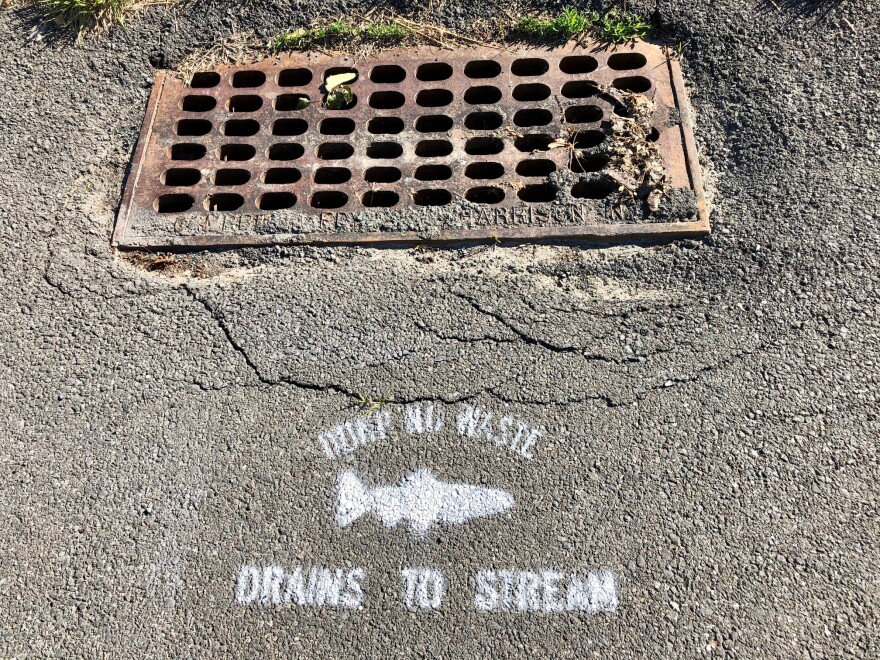Albany's municipal water system made it through the worst of the pandemic without a hiccup.
Albany Water Commissioner Joe Coffey says when word of COVID-19 came, the water department executed policies to protect employees, the water supply and city residents.
"There was a lot of uncertainty as to how this was being transmitted so I think initially, following CDC guidance we were concerned that any of the transmission was likely gonna be through some inhalation or getting it on your face, eyes, that type of thing. So our folks are pretty used to wearing personal protective equipment and we all have masks so we immediately told our guys 'hey, when you're out working make sure you've got face mask protection on. And our guys are used to wearing guards when they're working in and around the sanitary sewers becuase obviously anything that can be pathogenic can be transmitted in the sewers. Folks also had questions whether or not COVID is in drinking water, but then again, recognize that most pathogens and viruses and bacteria are killed by chlorine, and we certainly chlorinate our water and it gets additional protection up in the Loudonville Reservoir where you have ultraviolet disinfection."

Coffey monitored daily briefings by the Albany County Health Department. He says essential workers and security guards never faltered, as crews were rotated.
"For example if we have two crews on our water transmission maintenance, we'd have one crew work for a week and then we'd have one crew stay at home and we would alternate that. That way, if one crew member got sick or got exposed, and we had to put the other folks in quarantine for a timeframe, we weren't gonna be at a dodge, we still had other folks that could work. So we really did that for the first three or four weeks. Ironically we had one COVID positive case like right early, the first week that this went on. We immediately put 9 or 10 or our folks into a two-week quarantine. Thankfully, nobody else became infected."
Though public access to the water department was closed March 15th, Coffey says a month later much of the staff was back at work while following guidelines for social distancing and interacting. Meetings were conducted via Zoom. Shifts were staggered at the water processing plant and mask-wearing was enforced. Employees were also screened for any apparent symptoms at the beginning of every workday. Interaction with contractors and the public was conducted online on what Coffey terms "a regimented and restricted basis."
Coffey says pandemic aside, the city routinely experiences water main breaks, due in part to aging pipes (some that pre-date 1900) and routine wear and tear on the system. For the most part they don't impact supply.
"We do five-year capital plans and in the last three or four years that five-year plan has been running about $100 million dollars or $20 million dollars a year. Last year, our capital investments in our water and sewer system amounted to nearly $29 million. That's been the most that has been spent probably since the water board had taken the system over in the late 1980s. There's been substantial investment in the system in the last six years and that's gonna continue."
Coffey says the $45 million dollar Beaver Creek Clean River Project is in final design, and should go out to bid this year, with contruction set to begin in 2021 and be completed in 2023. Coffey says the water department has also received grant money for other capital improvement projects.
"For example, for folks that drive around the OGS-Harriman Campus, there's been some construction around there, we just built a large sewage pump station around the ring road that's gonna allow us to take 3 million gallons a day of waste water dry weather flow from the campus at SUNY, take that out of the Beaver Creek combined system, send it over to the Patroon Creek, also, if people have been driving up around Colvin Avenue we've had a lot of cones up there for awhile, we did start completing a water booster pump station that will connect to a new tank we built, a one-million gallon tank on the Harriman Campus, working with OGS. That's going to help us increase pressures in the upper Washington Avenue area heading out towards SUNY and Fuller Road."

Coffey says there are many more ongoing and planned projects. He notes Albany's Alcove Reservoir, in place since 1929, is one of the best municipal water supply sources in the Northeast and has been carefully conserved.
Former EPA Regional Administrator Judith Enck agrees clean drinking water from the Alcove is Albany's most important asset.
"It's important that that water be protected. Within the environmental regulatory arena there's a term called 'source water protection' which means you protect it at the source as opposed to spending massive amounts of money trying to filter out contaminants after there are levels of contamination in it."
Coffey notes when PFAS contamination first made headlines a few years ago, Albany tested its water to be on the safe side and found none. He adds even the way wastewater is channelled through the sewer system has been carefully planned out.
"Catch basins and inlets are part of a combined sewer that they're gonna go ultimatley to the Hudson River. Some of them are in seperated sewers that go directly to a water body, some go to ponds." The complete conversation with Coffey is available below.





![Anti-Bioswale lawn signs along Albany's Ramsey Place [INSET: street resident Ed Vining]](https://npr.brightspotcdn.com/dims4/default/7f3db0b/2147483647/strip/true/crop/1120x624+0+57/resize/280x156!/quality/90/?url=http%3A%2F%2Fnpr-brightspot.s3.amazonaws.com%2Flegacy%2Fsites%2Fwamc%2Ffiles%2F201811%2FBIOSWALE.png)
